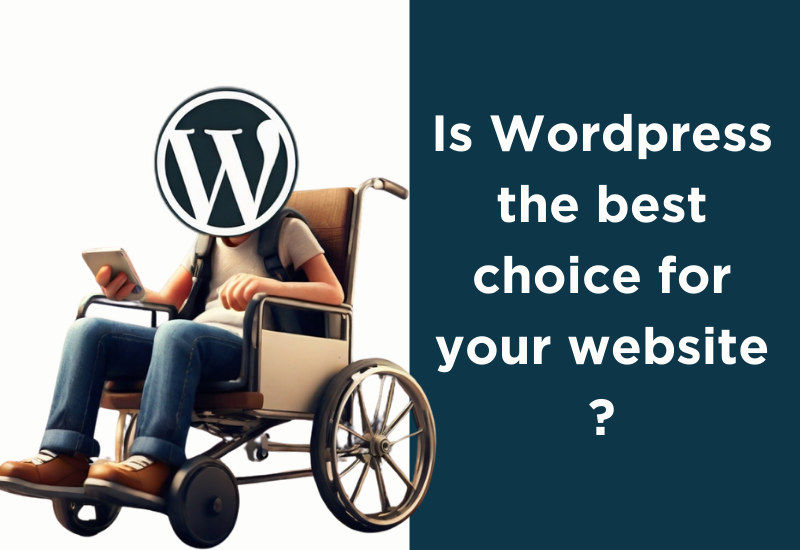
WE BRING YOUR IDEA TO LIFE
We have developed over 40 mobile applications for the world’s leading Enterprises and Startups.
Company
Services
Our Work
Solution

WordPress is one of the most popular and widely used platforms for creating websites. It powers over 40% of the web and has a loyal fan base of millions of users. However, WordPress is not the only option available, and it may not be the best fit for every project. There are many factors to consider before deciding whether to use WordPress or look for an alternative.
In this article, we will discuss the pros and cons of WordPress, and what you should keep in mind before choosing it for your website. We will also provide some examples of WordPress alternatives that you can explore if you want to try something different.
WordPress has many advantages that make it a popular choice for web development. Here are some of the main ones:
WordPress is widely used, and many clients still ask for it, making it a practical choice for freelancers and businesses due to its popularity and the availability of hosting solutions. WordPress also has a large and active community of developers, designers, and users who can provide support, feedback, and collaboration opportunities.
WordPress allows for quick site development and simple customizations, which can save time and result in more work done, making it a desirable option for delivering results to clients promptly. WordPress also has a low barrier to entry, as it is free and open-source, and does not require extensive coding skills to use.
WordPress is beginner-friendly, which is one of the reasons why it is a popular choice for starting into web development. Learning WordPress and PHP can be valuable for freelancers, as many freelance web development requirements are for WordPress and PHP, and it can contribute to gaining “full-stack” development skills and expertise. There is an abundance of skill if you prefer to go ahead with WordPress.
WordPress is a stable and mature platform that offers a wide range of plugins and themes, making it a flexible and user-friendly solution for various web development needs. WordPress plugins and themes can extend the functionality and appearance of your website, allowing you to create anything from blogs and portfolios to eCommerce and membership sites. WordPress also has a simple and intuiti ve dashboard that lets you manage your site easily.
WordPress is still the majority of the internet. The high adaptation of WordPress enabled many not so tech-savvy users to build muscle memory over the years as they have used the same functionalities repetitively over the years on multiple websites. So in that way, it has helped in standardizing the face of the internet.
WordPress is not without its drawbacks, however. Here are some of the main ones:
WordPress sites can be vulnerable to security issues, particularly due to outdated or insecure plugins. It is essential to keep plugins updated and use them judiciously to mitigate security risks. WordPress also requires regular backups and maintenance to ensure your site is running smoothly and safely.
While WordPress offers a wide range of themes and plugins for customization, using pre-built themes can make a website look generic, potentially impacting its reputation. Customizing a theme can be an option, but it may negate the convenience of using WordPress. WordPress also has a reputation of being slow, bloated, and prone to errors, which may affect your site’s performance and user experience.
Many individuals fall for the notion of WordPress being a completely free option for them, but the expenses of customization and maintenance are often not considered by them at the initial stages. This often costs them more in the longer run. WordPress also has a steep learning curve if you want to master its advanced features and create custom solutions. WordPress may not be the most cost-effective or valuable option for your website in the long term.
As the new generation is used to web 2.0, social media and live chats, WordPress lags far behind than the standard tech stack used in making such experience possible like React.JS and Angular.Js. WordPress may not be able to keep up with the changing trends and demands of the modern web, and may limit your creativity and innovation.
Progressive Web Apps (PWA) are touted as the future of app distribution. They are web applications that can work offline, load faster, and provide a native-like experience to users. WordPress does not support PWA out of the box, and requires additional plugins and configurations to make it work. If the market goes in that direction, you may fail to capture the possibilities and may have to spend a lot more resources than you actually should have.
WordPress is a powerful and versatile platform that can help you create amazing websites. However, it is not the best solution in most cases, especially if you are looking to build an online startup. The customisation will take about time and effort when you compare to the most popular and powerful tech stacks like react. You should weigh the pros and cons before choosing wordpress over other technologies.
We hope we helped you in making a decision. Please read our other blogs on custom software solutions development and related topics.




